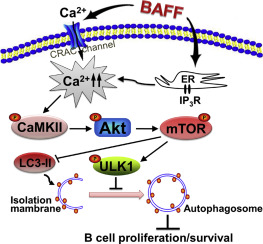当前位置:
X-MOL 学术
›
Cell. Signal.
›
论文详情
Our official English website, www.x-mol.net, welcomes your feedback! (Note: you will need to create a separate account there.)
BAFF inhibits autophagy promoting cell proliferation and survival by activating Ca2+-CaMKII-dependent Akt/mTOR signaling pathway in normal and neoplastic B-lymphoid cells.
Cellular Signalling ( IF 4.8 ) Pub Date : 2018-09-20 , DOI: 10.1016/j.cellsig.2018.09.012 Xiaoqing Dong 1 , Jiamin Qin 1 , Jing Ma 1 , Qingyu Zeng 1 , Hai Zhang 1 , Ruijie Zhang 1 , Chunxiao Liu 1 , Chong Xu 1 , Shuangquan Zhang 1 , Shile Huang 2 , Long Chen 1
Cellular Signalling ( IF 4.8 ) Pub Date : 2018-09-20 , DOI: 10.1016/j.cellsig.2018.09.012 Xiaoqing Dong 1 , Jiamin Qin 1 , Jing Ma 1 , Qingyu Zeng 1 , Hai Zhang 1 , Ruijie Zhang 1 , Chunxiao Liu 1 , Chong Xu 1 , Shuangquan Zhang 1 , Shile Huang 2 , Long Chen 1
Affiliation

|
B cell activating factor from the TNF family (BAFF) is implicated in not only the physiology of normal B cells, but also the pathophysiology of aggressive B cells related to malignant and autoimmune diseases. Autophagy plays a crucial role in balancing the beneficial and detrimental effects of immunity and inflammation. However, little is known about whether and how excessive BAFF mediates autophagy contributing to B-cell proliferation and survival. Here, we show that excessive human soluble BAFF (hsBAFF) inhibited autophagy with a concomitant reduction of LC3-II in normal and B-lymphoid (Raji) cells. Knockdown of LC3 not only potentiated hsBAFF inhibition of autophagy, but also attenuated hsBAFF activation of Akt/mTOR pathway, thereby diminishing hsBAFF-induced B-cell proliferation/viability. Further, we found that hsBAFF inhibition of autophagy was Akt/mTOR-dependent. This is supported by the findings that hsBAFF increased mTORC1-mediated phosphorylation of ULK1 (Ser757); Akt inhibitor X, mTORC1 inhibitor rapamycin, mTORC1/2 inhibitor PP242, expression of dominant negative Akt, or knockdown of mTOR attenuated hsBAFF-induced phosphorylation of ULK1, decrease of LC3-II level, and increase of cell proliferation/viability. Chelating intracellular free Ca2+ ([Ca2+]i) with BAPTA/AM or preventing [Ca2+]i elevation using EGTA or 2-APB profoundly blocked hsBAFF-induced activation of Akt/mTOR, phosphorylation of ULK1 and decrease of LC3-II, as well as increase of cell proliferation/viability. Similar effects were observed in the cells where CaMKII was inhibited by KN93 or knocked down by CaMKII shRNA. Collectively, these results indicate that hsBAFF inhibits autophagy promoting cell proliferation and survival through activating Ca2+-CaMKII-dependent Akt/mTOR signaling pathway in normal and neoplastic B-lymphoid cells. Our findings suggest that manipulation of intracellular Ca2+ level or CaMKII, Akt, or mTOR activity to promote autophagy may be exploited for prevention of excessive BAFF-induced aggressive B lymphocyte disorders and autoimmune diseases.
中文翻译:

BAFF通过激活正常和赘生性B淋巴样细胞中Ca2 + -CaMKII依赖的Akt / mTOR信号通路来抑制自噬,促进细胞增殖和存活。
来自TNF家族(BAFF)的B细胞活化因子不仅与正常B细胞的生理有关,而且与与恶性和自身免疫性疾病有关的侵袭性B细胞的病理生理也有牵连。自噬在平衡免疫和炎症的有益和有害作用中起着至关重要的作用。然而,关于过量的BAFF是否以及如何介导自噬导致B细胞增殖和存活的了解甚少。在这里,我们显示了过量的人类可溶性BAFF(hsBAFF)抑制了自噬,并伴随着正常和B淋巴(Raji)细胞中LC3-II的减少。敲低LC3不仅增强了hsBAFF对自噬的抑制,而且减弱了hsBAFF对Akt / mTOR途径的激活,从而降低了hsBAFF诱导的B细胞增殖/活力。进一步,我们发现hsBAFF抑制自噬是Akt / mTOR依赖性的。hsBAFF增加mTORC1介导的ULK1(Ser757)磷酸化的发现支持了这一点。Akt抑制剂X,mTORC1抑制剂雷帕霉素,mTORC1 / 2抑制剂PP242,显性负性Akt的表达或mTOR的敲低减弱了hsBAFF诱导的ULK1的磷酸化,LC3-II水平的降低以及细胞增殖/活力的增加。用BAPTA / AM螯合细胞内游离Ca2 +([Ca2 +] i)或使用EGTA或2-APB防止[Ca2 +] i升高,可深深阻止hsBAFF诱导的Akt / mTOR活化,ULK1磷酸化和LC3-II降低随着细胞增殖/活力的增加。在被KN93抑制或被CaMKII shRNA抑制的CaMKII细胞中,观察到了类似的效果。总的来说,这些结果表明,hsBAFF通过激活正常和赘生性B淋巴样细胞中Ca2 + -CaMKII依赖的Akt / mTOR信号传导途径来抑制自噬,从而促进细胞增殖和存活。我们的发现表明,可利用操纵细胞内Ca2 +水平或CaMKII,Akt或mTOR活性来促进自噬,以预防过度的BAFF诱导的侵袭性B淋巴细胞疾病和自身免疫性疾病。
更新日期:2018-09-20
中文翻译:

BAFF通过激活正常和赘生性B淋巴样细胞中Ca2 + -CaMKII依赖的Akt / mTOR信号通路来抑制自噬,促进细胞增殖和存活。
来自TNF家族(BAFF)的B细胞活化因子不仅与正常B细胞的生理有关,而且与与恶性和自身免疫性疾病有关的侵袭性B细胞的病理生理也有牵连。自噬在平衡免疫和炎症的有益和有害作用中起着至关重要的作用。然而,关于过量的BAFF是否以及如何介导自噬导致B细胞增殖和存活的了解甚少。在这里,我们显示了过量的人类可溶性BAFF(hsBAFF)抑制了自噬,并伴随着正常和B淋巴(Raji)细胞中LC3-II的减少。敲低LC3不仅增强了hsBAFF对自噬的抑制,而且减弱了hsBAFF对Akt / mTOR途径的激活,从而降低了hsBAFF诱导的B细胞增殖/活力。进一步,我们发现hsBAFF抑制自噬是Akt / mTOR依赖性的。hsBAFF增加mTORC1介导的ULK1(Ser757)磷酸化的发现支持了这一点。Akt抑制剂X,mTORC1抑制剂雷帕霉素,mTORC1 / 2抑制剂PP242,显性负性Akt的表达或mTOR的敲低减弱了hsBAFF诱导的ULK1的磷酸化,LC3-II水平的降低以及细胞增殖/活力的增加。用BAPTA / AM螯合细胞内游离Ca2 +([Ca2 +] i)或使用EGTA或2-APB防止[Ca2 +] i升高,可深深阻止hsBAFF诱导的Akt / mTOR活化,ULK1磷酸化和LC3-II降低随着细胞增殖/活力的增加。在被KN93抑制或被CaMKII shRNA抑制的CaMKII细胞中,观察到了类似的效果。总的来说,这些结果表明,hsBAFF通过激活正常和赘生性B淋巴样细胞中Ca2 + -CaMKII依赖的Akt / mTOR信号传导途径来抑制自噬,从而促进细胞增殖和存活。我们的发现表明,可利用操纵细胞内Ca2 +水平或CaMKII,Akt或mTOR活性来促进自噬,以预防过度的BAFF诱导的侵袭性B淋巴细胞疾病和自身免疫性疾病。



























 京公网安备 11010802027423号
京公网安备 11010802027423号